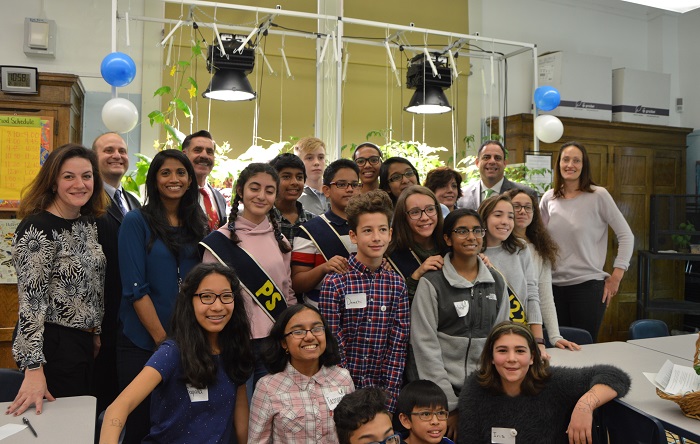
P.S Labs (Photo Constantinides)
Dec. 11, 2017 By Tara Law
Hydroponic science labs, equipped with hands-on scientific tools for students to learn about biology and the environment, were officially opened at an Astoria school on Friday.
Councilmember Costa Constantinides held a ribbon cutting to officially open the labs at P.S. 122, a Pre-K to 8th grade school located at 21-21 Ditmars Blvd. Two labs were installed, with one lab designated for the elementary school students and the other for children in the middle school.
Plants and equipment— providing water and light— were installed in the labs to help students study topics such as biology, agriculture, sustainability, technology and nutrition.
“With these innovative learning spaces, children have the opportunity to interact with plants, study biology of how they grow and receive meaningful lessons in ecology and agriculture,” Constantinides said.
The project is part of Constantinides’ Science 2050 Learning Initiative, which aims to improve science learning spaces at local schools. Constantinides announced the initiative in Jan. 2016 as part of a larger plan to make the city more environmentally friendly.
A $160,000 allocation from the City Council’s 2017 budget was designated for the P.S. 122 labs. Nearly $2 million in that budget was allocated to improve science learning spaces at schools in the district, such as hydroponic science labs, STEM labs and technology upgrades.
Construction took place at P.S.122 over the summer, and the labs went into use when the school year started in September.
Constantinides discussed the value of a “multifaceted” and modern learning experience for children at the ribbon cutting.
“Giving children the tools they need for a 21st Century academic experience will ensure that they can become our future leaders,” Constantinides said.
Anna Aprea, the principal at P.S. 122, said that it was particularly important for children living in an urban environment to gain perspective on the natural world.
“By bringing what is typically outdoors inside the classroom, we hope to connect our students to the greater environment,” said Aprea.
Constantinides has introduced several bills in the City Council that focus on science and a sustainable environment. In 2014, the Council unanimously passed his bill to reduce the City’s Carbon emissions 80 percent by 2050.
In a speech announcing the budget allocation last January, Constantinides emphasized the importance of educating children about the natural world in the face of a changing climate.
“We must ensure that the next generation understands the seriousness of climate change,” said Constantinides. “In the era of fake news and information bubbles, it is even more imperative that they can learn the correct science and information, based on the facts and not on ideology.”
One Comment

Good use of public funds. Very interesting things being done with hydroponics these days with vertical farming and other techniques to utilize urban space – very hot topics at top colleges recently.